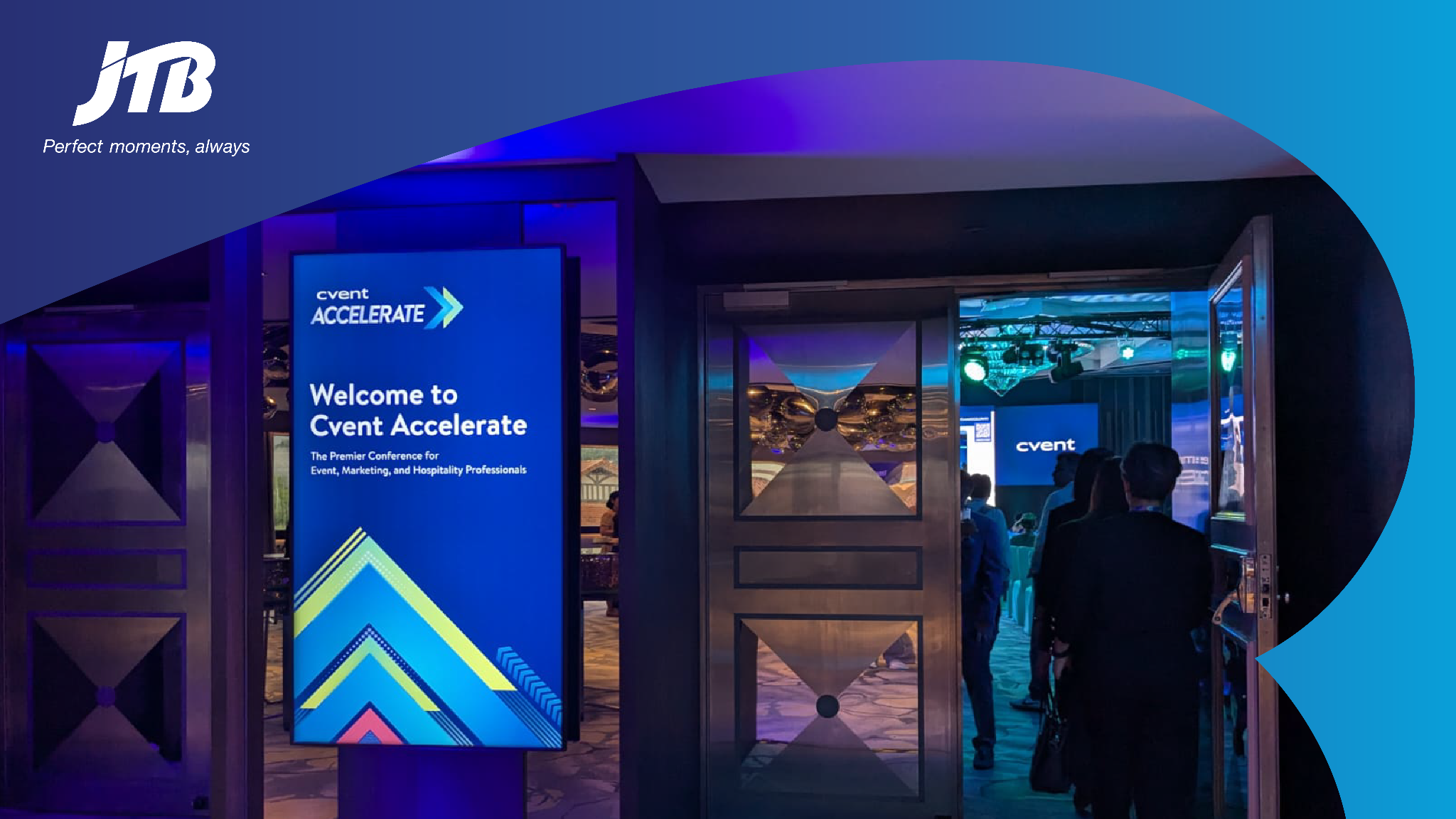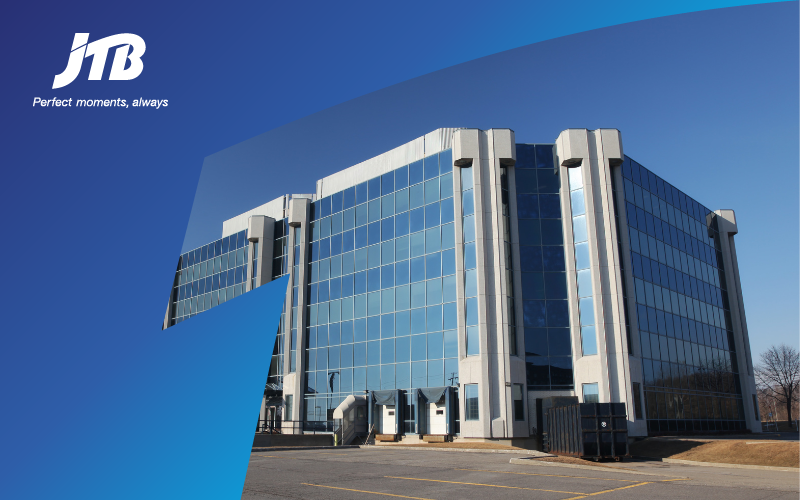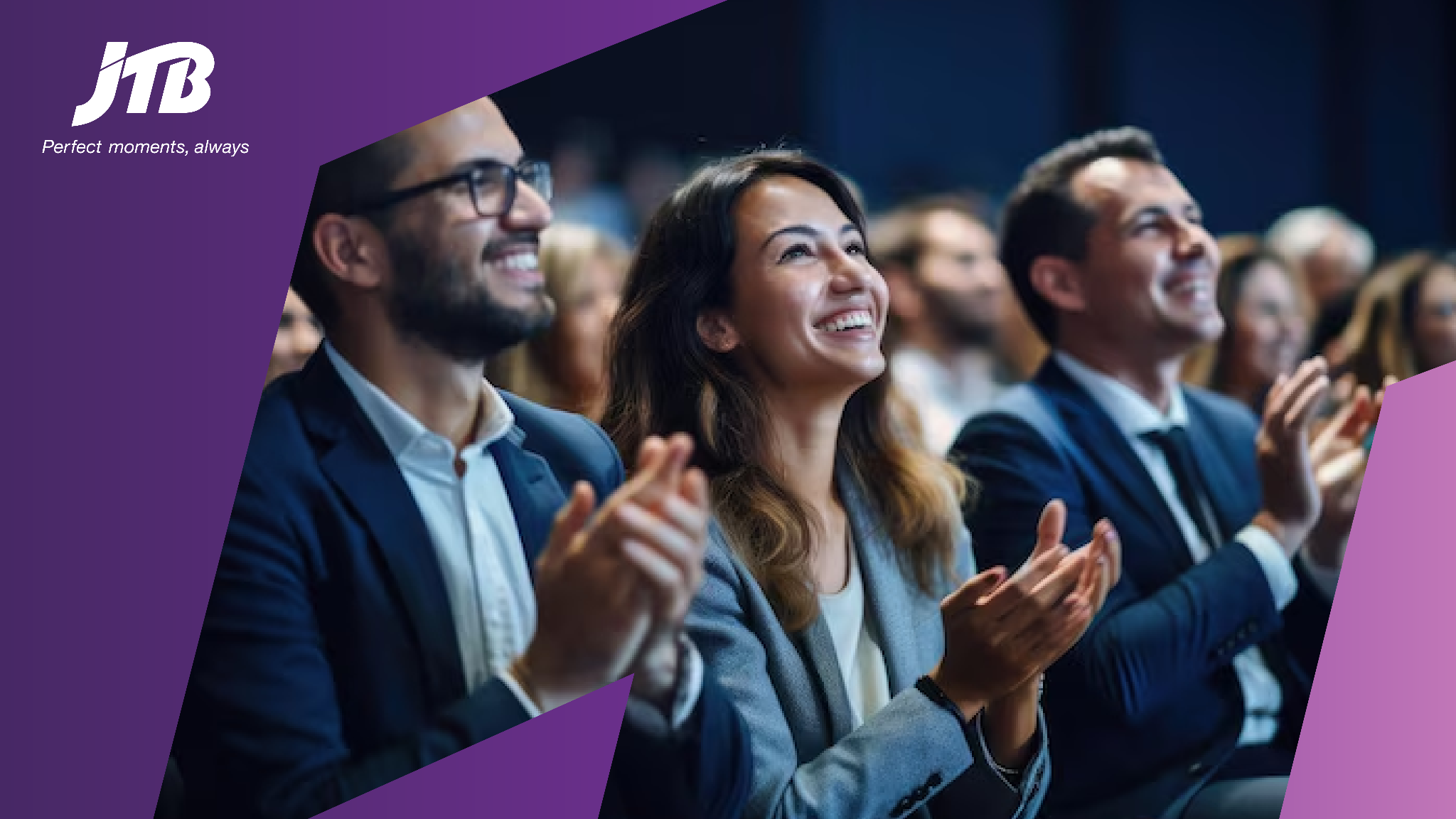JTB, a leader in strategic meeting management, recently attended Cvent Accelerate Singapore 2024. This event brought together event planners, marketers, and hospitality professionals to explore the latest trends, technologies, and strategies shaping the future of the events industry. Representing JTB at the event was the Head of Strategic Partnerships & Relationship Management for the SMM Business Division, Mizuho Hara, who engaged in meaningful discussions and exchanged insights with industry peers.
The event kicked off with a welcome speech by Brian Ludwig, Senior Vice President of Sales for Event Solutions at Cvent. Ludwig set the tone for the event by emphasizing the unmatched power of in-person events.
He highlighted Cvent’s extensive reach with the platform having been used to manage over 7 million events since 1999, and discussed the growing importance of technology in overcoming time and budget constraints. Ludwig also revealed that Singapore has been named the #1 destination in Cvent’s 2024 list of top meeting destinations, reflecting the city’s thriving MICE tourism market, set to surpass 3 billion Singapore dollars by the end of 2024.
Beyond this, Ludwig outlined several core themes for the industry: staying ahead of trends such as AI, sustainability, accessibility, and DEI; responding to heightened stakeholder expectations; and leveraging technology to enhance event experiences. He also stressed the importance of technology as an enabler, noting that 63% of event professionals in Asia are highly receptive to tech advancements in the event industry.
The Power of Human Connection in an AI-Dominated World
In the opening keynote, Simone Heng, an award-winning author and renowned human connection specialist, emphasized the importance of human connection in a world increasingly dominated by AI.
Heng argued that while AI can facilitate connections, it cannot replace the depth and authenticity of human interactions. She discussed the loneliness epidemic and its implications for events, urging attendees to create environments that foster genuine connections through vulnerability and empathy.
Uncovering the Story of Events Data
The next highlight was a panel discussion on how event planners could utilize data moderated by Will Kataria, Senior Director and General Manager of Asia at Cvent. The panel featured industry experts from Flexx CMO, Marina Bay Sands, Dusit Hotels & Resorts, Millennium Hotels & Resorts, and Unearthed Productions.
The discussion began with an overview of the increasing importance of data in the events industry. The panel emphasized how data-driven insights can transform event planning and execution. One key point was the power of data in personalizing messages, explaining how targeted communication can enhance attendee engagement and satisfaction. Another important aspect was the role of data in segmenting marketing efforts, enabling event organizers to tailor their strategies to different audience segments effectively.
Panelists shared their experiences in capturing and analyzing data, providing practical tips on gathering meaningful insights from various touch points throughout an event. They stressed the need for robust data collection mechanisms and the importance of integrating data from multiple sources to get a comprehensive view of attendee behavior.
The panelists also tackled challenges associated with data usage, particularly in terms of data security and privacy. They discussed strategies for ensuring responsible data handling and compliance with regulations, emphasizing the importance of gaining attendees’ trust.
The discussion concluded with a focus on the importance of actionable data. The panel highlighted real-time data as a tool to make informed decisions during an event, improving the overall attendee experience. They shared examples of data insights being used to enhance event experiences, such as personalizing event content based on attendee’s interests.
Debunking AI Myths and Embracing Opportunities for Success
Harsha Hariharan, Regional Sales Director of Event Solutions at Cvent, took the stage to explore AI and its applications in the events industry. Hariharan’s session was both enlightening and practical, shedding light on how AI can revolutionize event planning and execution.
Hariharan started by discussing AI’s potential to automate repetitive tasks, freeing up event planners to focus on more strategic activities. He highlighted specific examples, such as using AI to manage attendee registration, streamline communication, and handle logistical details. By automating these tasks, event professionals can save time and reduce the risk of human error.
Next, Hariharan delved into AI’s role in content creation. He explained how AI tools can generate personalized content for different segments of attendees, ensuring that each participant receives information tailored to their interests and needs. This can enhance the overall attendee experience, making events more engaging and relevant.
Addressing common misconceptions about AI, Hariharan emphasized that AI is not infallible nor a job destroyer. Instead, it should be viewed as a tool that augments human creativity. He illustrated this point with examples of AI assisting in designing event layouts, optimizing schedules, and even predicting attendee preferences based on past behavior.
Enhancing Efficiency and Cost Savings with Event Tech
Valerie Liow, Account Manager for Event Solutions at Cvent, moderated a session focused on enhancing efficiency and cost savings through event technology. In this session, Yeow Ching Shiong from SMU College of Graduate Research Studies and Diana Sani from Chab Events shared their insights on the topic.
They began by discussing how technology has streamlined event processes over the years, particularly through on-site registration systems and live polling tools. These innovations reduce wait times and boost attendee engagement, leading to smoother and more interactive events while optimizing resource allocation and cutting costs.
Yeow and Sani also shared strategies for overcoming tech implementation roadblocks. They stressed the importance of thorough planning and testing to ensure seamless integration, which improves operations and reduces costs. Integrating technology into event design from the outset, rather than treating it as an afterthought, can enhance the event experience and improve efficiency.
Finally, the speakers discussed how technology reduces stress for both planners and attendees. Automated processes and real-time data feedback lighten the workload on event staff, making event management more efficient. This efficiency translates into cost savings by minimizing the need for extra manpower and resources.
Event ROI: Linking Events to Revenue
In a particularly illuminating session, Will Kataria from Cvent tackled the critical question of event ROI, especially amid post-pandemic budget constraints. Kataria highlighted the mounting pressure on event planners and marketers to effectively demonstrate ROI. He presented compelling data on event attribution, emphasizing the importance of granular data in lead scoring and personalization.
Kataria explained how event planners now face greater scrutiny from stakeholders who demand clear evidence of value and returns on their investments. He underscored the need for detailed and actionable data, which can transform how planners approach ROI measurement. By leveraging granular data, planners can accurately track attendee engagement and interactions, allowing for more precise lead scoring and targeted personalization.
Kataria also discussed the integration of event tech with marketing technology and CRM (customer relationship management) systems. This integration aligns attendee data with sales and marketing efforts, creating a cohesive strategy that clearly demonstrates the impact of events on the bottom line. He shared examples of successful integrations where event data seamlessly flowed into CRM systems, providing sales teams with valuable insights and enhancing follow-up strategies.
Furthermore, Kataria advocated for a holistic approach to ROI measurement, one that considers both quantitative and qualitative metrics. He encouraged planners to look beyond immediate financial returns and consider long-term brand-building and customer relationship outcomes. By adopting this comprehensive perspective, planners can better communicate the multifaceted value of events to stakeholders.
Achieving Growth with Flat Budgets and Teams
Next, Anthony Lion and Devan Sehgal, Regional Sales Managers at Cvent, explored strategies for scaling event programs despite rising costs and resource limitations. They highlighted the growing trend of webinars as a cost-effective alternative to traditional in-person events, underscoring their ability to reach broader audiences.
On top of that, Lion and Sehgal also stressed the importance of centralizing resources and consolidating technology to achieve efficiencies. Simplifying event management through unified platforms reduces redundancies and operational costs. By centralizing teams, companies can also enhance collaboration and productivity, ensuring cohesive event execution.
Their session included practical advice such as selecting comprehensive event management platforms and effectively training staff. By leveraging data analytics, organizations can optimize event strategies and enhance attendee experiences, driving higher engagement and satisfaction.
The Future of Event Tech: Exploring the Road Ahead
Following this, Brian Ludwig returned to the stage to moderate an insightful session on the future of event tech. Departing from the tactical discussion format of previous sessions, Ludwig guided attendees through visualisation of possible technological innovations that could be adopted into the events industry over the coming decades.
The session explored groundbreaking technologies poised to reshape event experiences, including turnstile-powered events that enhance engagement through interactive entry systems, foot-powered events leveraging kinetic energy for sustainable activations, and 3D-printed food offering customized culinary delights on demand while reducing food wastage.
Attendees gained a firsthand look at these cutting-edge trends that promise to revolutionize the landscape of event management and attendee engagement. Here, Ludwig shared how these innovations can elevate event experiences, drive attendee satisfaction, and future-proof event strategies against evolving industry demands.
Innovative Event Design: Reflecting Brand Values through Accessible, Sustainable, and Inclusive Experiences
Finally, in a session on innovative event design, Nico Nicholas, CEO and Co-Founder of Trees4Events, led a panel of experts including Edward Koh (Singapore Tourism Board), Ian Wu (SACEOS), Manpreet Kaur (CVENT), Ailynn Seah (The Lumiere Consultancy), and Dennis McComb (PMG Asia) in a discussion about Singapore’s progress towards sustainability goals and explored innovations in sustainable event design, while also addressing accessibility and cultural sensitivity.
They offered practical advice on integrating sustainability into event planning, avoiding greenwashing, and ensuring accessibility and cultural sensitivity. The session emphasized the importance of education, certification, and creative solutions in achieving these goals.
A Final Word on Cvent Accelerate 2024
The Cvent Accelerate 2024 conference in Singapore proved to be a pivotal event for JTB and industry professionals alike, showcasing the dynamic evolution of the events landscape. From insightful keynote addresses on the power of human connection in an AI-driven world to practical sessions on leveraging data analytics and cutting-edge technologies, attendees gained invaluable perspectives and strategies to navigate the future of event planning.
As industry leaders gathered to discuss sustainability, accessibility, and innovation in event design, it became clear that the future of events is intricately linked with technology, personalized experiences, and a commitment to creating meaningful connections. The conference not only highlighted Singapore’s prominence as a leading MICE destination but also emphasized the importance of collaboration and forward-thinking strategies in delivering exceptional event experiences.
Looking ahead, the lessons learned and relationships forged at Cvent Accelerate 2024 will continue to drive innovation and excellence in the global events industry. With a renewed focus on technology integration, attendee engagement, and sustainable practices, the stage is set for continued growth and transformation in events worldwide.


















